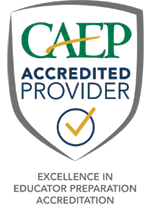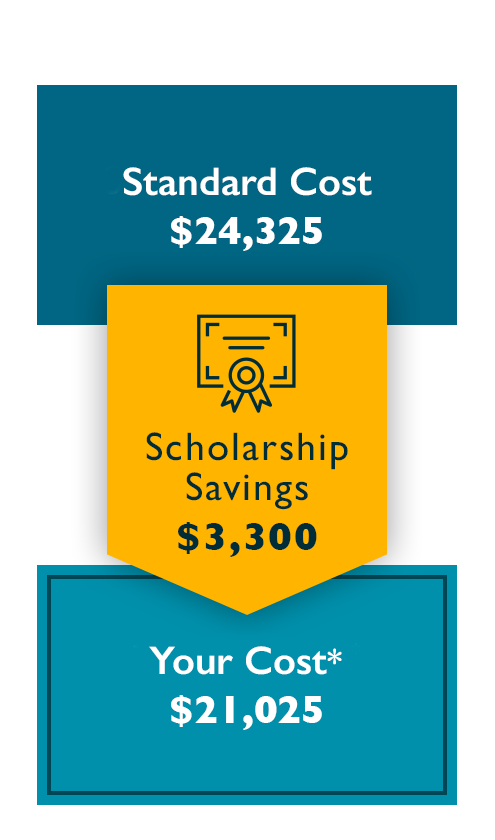Why Choose Walden?
Program Details
Curriculum
Completion Requirements
- 70 quarter credits
View the COMPLETE CURRICULUM PLAN.
This sequence represents the minimum time to completion. Time to completion will vary by student, depending on individual progress and credits transferred, if applicable. For a personalized estimate of your time to completion, call an Enrollment Specialist at 1-866-492-5336.
Earn a Degree From a CAEP-Accredited College of Education

Admission Requirements
Program Admission Considerations: A bachelor's degree or higher.
General Admission Requirements: Completed online application and transcripts. Please note that the materials you are required to submit may vary depending on the academic program to which you apply. More information for international applicants.
| Curriculum Component | Requirements | Cost | AMOUNT |
|---|---|---|---|
| Tuition | 70 quarter credit hours | $330 per quarter hour | $23,100 |
| Program Fee | Per quarter | $175 | $1,225 |
| $24,325** | |||
| BELIEVE & ACHIEVE SCHOLARSHIP YOUR TUITION | -$3,300 $21,025* | ||
*Represents Fast Track option, minimum time to completion, no breaks during the program, and Believe and Achieve Scholarship. Your actual total program time and costs may vary.
**The tuition reflects the minimum time to completion. Time to completion varies by student, depending on individual progress and credits transferred, if applicable. Tuition and time to complete may be reduced if transfer credits are accepted, or if you receive grants, scholarships or other tuition reductions. For a personalized estimate of the number of your transfer credits that Walden would accept, call an Enrollment Specialist at 844-768-1080.
Tuition and fees are subject to change. Books and materials are not included and may cost between $1,300 to $1,800.
Program Outcomes
Learn to Deliver Impactful Teaching Experiences
From realistic simulations to real-life student teaching, our online MAT - Elementary Education program equips you with the skills and confidence to make a difference for students in your community. Practice teaching in different environments, watch virtual field experience videos of expert teachers, and learn how to use technology to enhance the classroom experience. You’ll also explore K–6 content areas and the dynamics of effective planning, instruction, and assessment for diverse student populations.
Career Outlook
For years, schools across America have struggled to fill vacant teaching jobs—and this crisis has only intensified with the COVID-19 pandemic.1 Employment in public schools in November 2020 was down 8.7% from February—at its lowest level since 2000.2
Advance Teaching and Learning—and Your Career
With an online MAT - Elementary Education degree, you can empower countless children to reach their academic potential and help fill the current teacher shortage.
Earning your MAT prepares you for today’s new and evolving education landscape. You’ll gain the skills to teach face to face or via hybrid or online formats, using today’s latest technologies. A contemporary, culturally responsive MAT program also equips you with the insights needed to serve all students across a range of abilities, ethnicities, and socioeconomic backgrounds.
Learning Outcomes
As a graduate of our MAT - Elementary Education program, you’ll be prepared to:
- Demonstrate the skills necessary to create learning environments that facilitate meaningful learning experiences for elementary students.
- Demonstrate the professional dispositions of an elementary educator.
- Demonstrate the ability to implement differentiated learning experiences that support development in elementary students.
- Evaluate assessment data to make informed instructional decisions that promote student development.
- Demonstrate the ability to be culturally responsive to foster positive trusting relationships with a variety of stakeholders.
- Appropriately integrate a variety of learning technologies in the classroom.
- Demonstrate the ability to work collaboratively with others to improve educational outcomes for elementary children.
- Apply the results of research in the field of education to create positive social change.
- Demonstrate the skills necessary to be a reflective practitioner who actively seeks opportunities to grow professionally.
Related Articles
FAQ About Walden’s Online Master of Arts in Teaching – Elementary Education
Professionals seeking a Master of Arts in Teaching (MAT) are looking to become first-time teachers, and they often hold a bachelor’s in a discipline other than education. There are a variety of options when it comes to choosing a program, but a few key factors should be considered before deciding, including accreditation, flexibility, diversity, and support. First, look for an MAT program offered through an accredited college of education. Accreditation by the Council for the Accreditation of Educator Preparation (CAEP) signals the quality of educator preparation programs, as well as a commitment to continuous assessment and improvement. Flexible scheduling is also important, especially for working professionals—which is why online degree programs are such a popular choice. In addition, it’s vital to be able to connect with other professionals with diverse backgrounds, perspectives, and experiences, which can greatly enhance the MAT experience. Last, be sure to choose a university with a strong support team that is invested in helping you succeed.
The Council for the Accreditation of Educator Preparation (CAEP) is the only recognized national accreditor for educator preparation and aims to promote excellence through quality assurance and continuous assessment and improvement. Walden University is accredited by CAEP for a period of seven years, from April 2019 through June 2026. This accreditation covers initial teacher preparation programs, including the Master of Arts in Teaching program, and advanced educator preparation programs. Walden earned CAEP accreditation by meeting rigorous national standards and demonstrating excellence in the areas of content and pedagogy, clinical experiences, selectivity, program impact, and capacity for continuous improvement.
Employment of kindergarten and elementary school teachers is expected to grow 7% from 2020 to 2030, according to the Bureau of Labor Statistics. This creates an ongoing demand for highly qualified teachers who are prepared to meet students’ academic needs—and you could be one of them. If you have a passion for learning and the desire to help children develop the skills they need to succeed in life, choosing a teacher licensure preparation program like Walden’s Master of Arts in Teaching – Elementary Education program is a good choice. Gain the competencies and knowledge you need to earn your license and begin to make a difference in students’ lives.
The U.S. Department of Education divides its statistics between pre-kindergarten through eighth grade (grouping those as “elementary school”) and ninth grade through 12th grade (grouping those as “secondary school”). However, most school districts consider kindergarten through fifth or sixth grade to be elementary school, and most educational literature and teaching strategies define elementary education within that same K–6 range. In other words, while the statistics for elementary education include middle school, those in the profession use a more selective categorization.
The U.S. Department of Education divides its statistics between pre-kindergarten through eighth grade (grouping those as “elementary school”) and ninth grade through 12th grade (grouping those as “secondary school”). However, most school districts consider kindergarten through fifth or sixth grade to be elementary school, and most educational literature and teaching strategies define elementary education within that same K–6 range. In other words, while the statistics for elementary education include middle school, those in the profession use a more selective categorization.
Elementary school is a vital step in preparing children for a lifetime of learning. It’s where most children learn to read, where they learn the fundamental concepts of science and mathematics, and where they gain a basic understanding of the world and its history. Without these critical building blocks, all other learning would be difficult, if not impossible. In fact, some studies indicate that early learning can actually increase a student’s lifelong earning potential and encourage future educational attainment. In other words, the quality of education children receive in elementary school can affect their entire life.
To become an elementary education teacher, a student can expect to take courses such as the following:
- Community Building for Effective Classroom Management
- Literacy K–6: Instruction and Assessment
- Mathematics K–6: Instruction and Assessment
- Science K–6: Instruction and Assessment
- Demonstration Teaching/Seminar
While most education degree programs include coursework on teaching strategies, they don’t all prepare you for teacher certification. If you intend to pursue a job as a classroom teacher at any level, you’ll need a state-approved teacher preparation program that readies you for the important step of certification. While teacher licensure requirements vary by state, most require you to pass one or more skills tests and undergo a background check. Some states may require specific coursework in subjects ranging from history to multiculturalism.
1Source: National Education Association (NEA), The Teacher Shortage Can Be Addressed — With Key Changes.
2The Wall Street Journal, Teacher Shortage Compounds Covid-19 Crisis in Schools.
3Source: Bureau of Labor Statistics, Occupational Outlook Handbook, Kindergarten and Elementary School Teachers, SOC codes 25-2012 and 25-2021, Job Outlook. Retrieved March 2021. National job growth and salary estimates may not reflect local and/or short-term economic or job conditions, do not guarantee job growth or salaries, and are subject to change.
4Source: Walden University Office of Institutional Research and Assessment (OIRA), as of December 31, 2019.
Accreditation
Walden University’s Richard W. Riley College of Education and Human Sciences is accredited based on the Council for the Accreditation of Educator Preparation (CAEP) Standards through June 2026. This accreditation covers specific Walden initial teacher and advanced educator preparation programs, including the BS in Elementary Education, Master of Arts in Teaching (MAT) – Special Education specialization, MS in Education – Educational Leadership and Administration specialization, and EdS in Educational Leadership and Administration. The MAT-SPED, MSED-ELA, and EdS-ELA programs were reviewed by Specialized Professional Associations (SPAs), which define content-area standards for programs, and achieved national recognition.
CAEP promotes excellence in educator preparation through quality assurance and continuous improvement. Walden’s College of Education and Human Sciences has earned national accreditation by demonstrating excellence in the areas of content and pedagogy, clinical experiences, selectivity, program impact, and capacity for continuous improvement. CAEP is a Council for Higher Education Accreditation (CHEA) – recognized national accreditor for educator preparation.
Licensure
Walden is approved by the Ohio Department of Higher Education to offer a program leading to initial principal licensure. Candidates seeking licensure in Ohio are responsible for completing any other Ohio requirements beyond Walden’s state-approved program. The Ohio Department of Higher Education is solely responsible for reviewing applications and issuing licenses.
Individuals interested in licensure in states other than Ohio may qualify by virtue of completing a state-approved educator preparation program; however, individuals must review their state’s regulations to ensure the program meets all requirements, paying particular attention to any requirements specific to out-of-state program completers. Individuals who reside in certain states may be ineligible to enroll in this program. Walden Enrollment Specialists can provide guidance on licensure questions; however, it remains the individual’s responsibility to understand and comply with all state licensure requirements. Walden makes no representation or guarantee that completion of Walden coursework or programs will permit an individual to obtain state licensure.
Walden is approved by the Minnesota Professional Educator Licensing and Standards Board (PELSB) to offer a program leading to a Minnesota Tier 3 license in Elementary Education. Candidates seeking licensure in Minnesota are responsible for completing all Minnesota requirements beyond Walden’s state-approved program, including passing the Minnesota Teacher Licensure Exams. The Minnesota Professional Educator Licensing and Standards Board (PELSB) is solely responsible for reviewing applications and issuing licenses.













